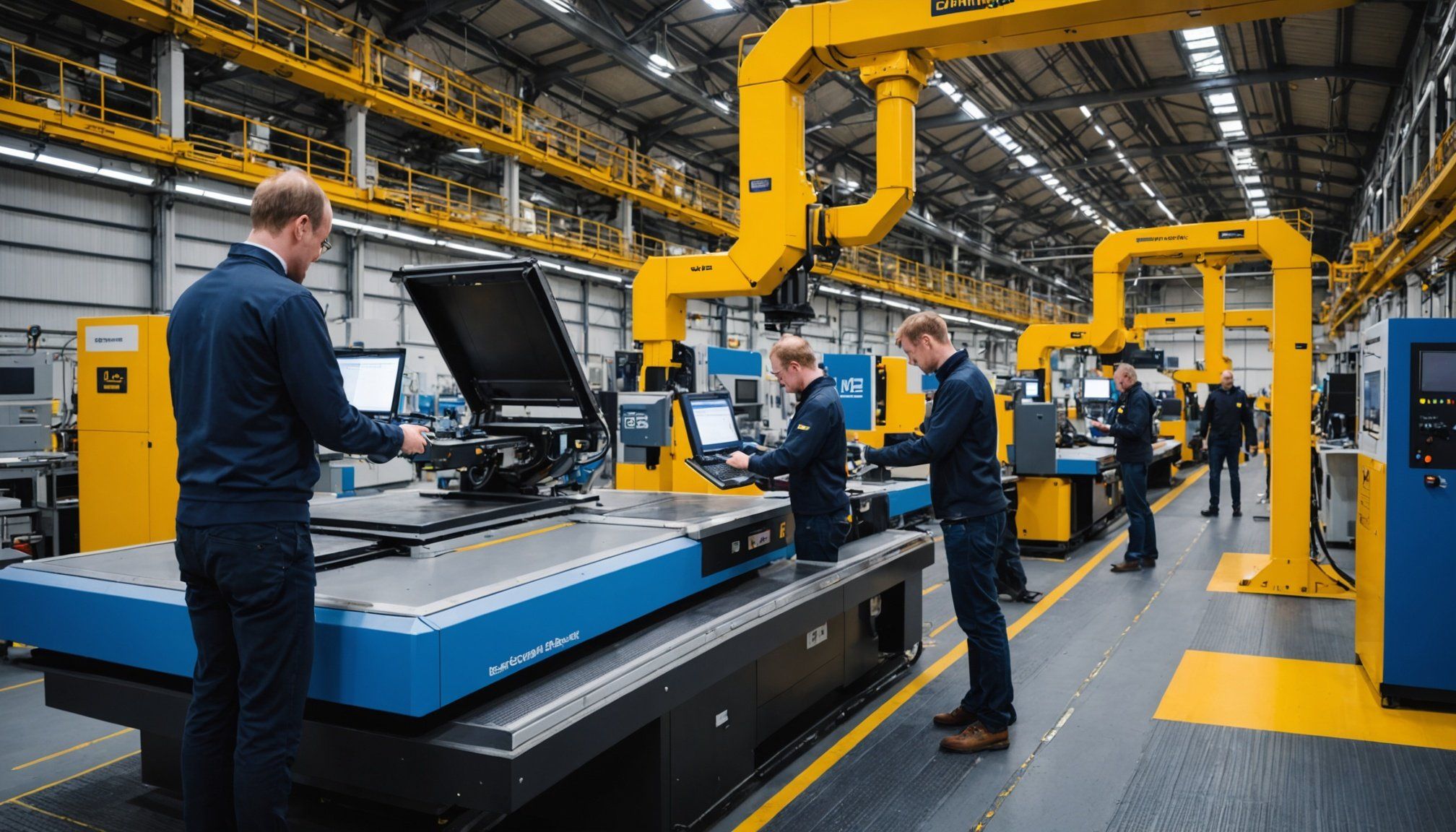Overview of Technology in UK Manufacturing
Technology in manufacturing has been pivotal in the United Kingdom’s industrial history. Traditionally, the manufacturing sector has embraced innovations to boost productivity and remain competitive globally. The transformation from mechanization in the Industrial Revolution to today’s Industry 4.0 signifies an ongoing evolution. This latest phase emphasizes digital technology, such as automation and data exchange, revolutionizing processes across industries.
Recent years have witnessed remarkable UK manufacturing trends. Manufacturers integrate smart technologies to stay ahead. This trend includes adopting automation, IoT applications, and AI solutions to increase efficiency and reduce manual errors. Statistics show a significant rise in output quality and reduction in production time when these technologies are effectively leveraged.
Also to discover : Exploring the impact of remote work on corporate culture in the uk: what changes lie ahead?
Modern technology not only enhances productivity but also supports manufacturers in meeting new market demands quickly and efficiently. In fact, adopting such sophisticated solutions has enabled UK manufacturers to adapt rapidly to shifts such as those observed during economic downturns or unexpected market changes. The integration of these technologies promises a promising future, ensuring that the UK manufacturing sector remains robust and continues to thrive on the global stage.
Key Technologies Reshaping Manufacturing
The automation in manufacturing plays a crucial role in transforming the way UK companies operate, focusing on efficiency and precision. By using robotics, manufacturers can streamline processes, reducing human errors and increasing production speed. For instance, companies like Rolls-Royce have implemented robots for complex tasks, such as engine assembly, ensuring high-quality outcomes. Adopting robotics often comes with challenges, including high initial costs and workforce training requirements. However, the long-term benefits, such as consistent output and reduced downtime, often outweigh these concerns.
Additional reading : Exploring the impact of sustainability on the financial landscape for uk businesses
The Internet of Things (IoT) is another significant technology enhancing operational efficiency. IoT devices allow real-time data collection, facilitating informed decision-making and predictive maintenance. For example, Jaguar Land Rover employs IoT systems to monitor vehicle production, optimising processes and preventing malfunctions. As IoT continues to evolve, its potential for developing fully smart factories in the UK is enormous, paving the way for even more sophisticated manufacturing environments.
In addition, AI in industry significantly impacts decision-making and maintenance strategies. AI applications analyze large datasets, providing insights that enhance production plans and anticipate equipment failures. While ethical considerations and the potential for job displacement exist, AI integration promises to revolutionise UK manufacturing sectors.
The Role of Innovation and Research
Manufacturing innovation is crucial for staying competitive in today’s rapidly evolving landscape. R&D in manufacturing focuses on developing new techniques and processes to meet sector demands. In the UK, the collaboration between industry and academic institutions is pivotal for pioneering solutions. These partnerships result in cutting-edge technologies, such as efficient production methodologies and new material applications.
Integral to the innovation landscape are technology partnerships between corporations and universities. These collaborations facilitate the transfer of knowledge, aiding the rapid adoption of breakthrough technologies. An example is the partnership between the University of Sheffield and major aerospace companies, which has spawned advancements in composite materials critical for fuel efficiency.
The UK’s commitment to fostering a strong R&D culture has birthed transformative solutions from additive manufacturing techniques to eco-friendly processes. By focusing on research and collaboration, manufacturers can drive innovation while addressing critical industry challenges. This ongoing dedication to innovation not only fuels industrial growth but also ensures that the UK remains a leader in manufacturing on the global stage.
Sustainability and Economic Implications
As the UK manufacturing sector evolves, sustainable manufacturing becomes increasingly critical. Technologies aimed at reducing the carbon footprint are central to this endeavour. Innovations such as energy-efficient machinery and recyclable materials are pivotal. These advancements are not only eco-friendly but also economically beneficial, often resulting in cost savings from decreased energy consumption and waste management.
Environmental regulations play a significant role in shaping manufacturing practices. Compliance with these regulations drives companies to invest in sustainable technologies, ensuring long-term viability. By doing so, manufacturers can enhance their global competitiveness, aligning with international sustainability standards.
On the economic front, adopting advanced technologies has substantial implications for cost efficiency and profit margins. Enhanced cost efficiency often emerges from streamlined processes and reduced resource wastage, leading to improved profit margins. Although technology integration may pose initial financial challenges, the long-term economic impact is generally favourable.
Additionally, government initiatives support this technological shift by offering incentives for innovation and sustainability. These measures encourage manufacturers to invest in cutting-edge technologies, fostering job creation in emerging industries while addressing potential employment shifts due to automation. In turn, they contribute significantly to the UK’s economic resilience and growth.
Future Trends in UK Manufacturing Technology
As technology continues to evolve, the future of manufacturing in the UK is primed for substantial transformation. Emerging technologies like blockchain and additive manufacturing are expected to play pivotal roles in driving this change. Blockchain can enhance supply chain transparency, enabling secure data sharing and reducing the risk of fraud. In manufacturing, additive techniques—such as 3D printing—offer significant potential for rapid prototyping and customisation, reducing material waste and production times.
Predictions suggest that future manufacturing trends will heavily focus on increasing connectivity and automation, integrating smart technologies throughout the production process. This transformation anticipates creating more adaptable and efficient manufacturing systems.
However, the sector faces challenges. Integrating new technologies poses risks, such as cybersecurity threats and data management issues. Additionally, the transition may require significant investment in upskilling the workforce, highlighting a critical challenge for the industry.
Opportunities abound for companies ready to embrace technological advancements. Firms that leverage these innovations can achieve greater operational efficiency and sustainable practices, ensuring a competitive edge in the global market. The ongoing evolution heralds a promising but complex new era for UK manufacturing.
Expert Opinions and Case Studies
To comprehend the future of UK manufacturing, examining insights from industry leaders is essential. These leaders provide valuable perspectives on how technology is shaping manufacturing in the region. For instance, Sir James Dyson, a prominent figure in the industry, emphasises the transformative power of automation and digital integration in enhancing efficiency. Such insights from experienced experts guide strategies for companies eager to stay competitive.
Insights from Industry Leaders
Key figures in UK manufacturing, like Sir James Dyson, underline the critical role of technological adoption. Their perspectives suggest that embracing technologies like IoT and AI will be central to future growth. These insights highlight how technology acts as a catalyst for innovation and enables companies to address evolving market demands.
Case Studies of Successful Adoption
Many UK manufacturers are leading with successful technology adoption strategies. Rolls-Royce, for example, leverages automation and robotics to achieve precision in engine assembly. Their strategic integration of cutting-edge technologies has resulted in consistent quality and reduced production downtime. By analysing these success stories, other manufacturers can identify effective strategies and potential pitfalls, gaining a competitive edge in the global market.



